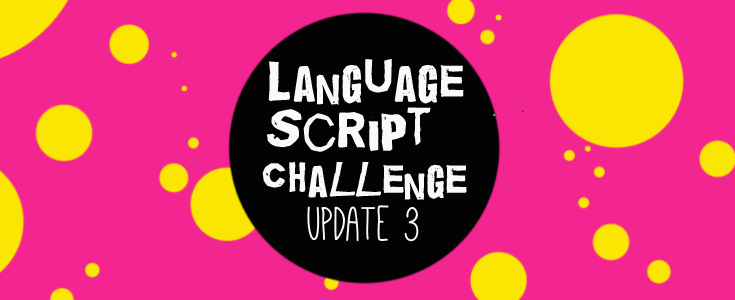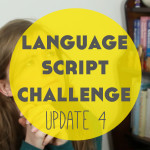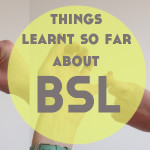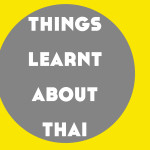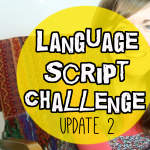April 3rd, 2015
Language Script Challenge: Update 3
Hey there! Can you believe this is the third monthly update of the Language Script Challenge already? Crazy times.
This month, the new scripts or alphabets were Devanagari, Braille, Khmer, and Amharic. Four that I knew absolutely nada about. Two were a lot easier than the other two. Can you guess which ones? I talk about this in the video below!
But first…I spotted something over on Instagram a couple of weeks back that made me really happy. The lovely Alex has taken on his very own personalised Language Script Challenge!
I just HAD to ask him more about this. So you can put a face to the name, here’s Alex meeting Benny Lewis at a book signing in Sydney.
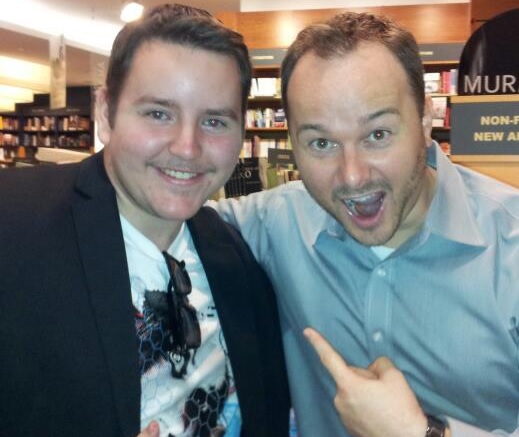
Which languages have you studied previously?
I’ve previously studied French, Russian, Italian and Serbian to varying degrees. I studied French in the 8th grade which I wasn’t particularly interested in and it was the only subject I failed that year. Russian followed a few years later when my friend Vuk was looking to re-acquaint himself with the language in preparation for his next overseas trip and when I saw some of his statuses on Facebook I approached him about learning the language. After that I decided to buy some Russian material and we conversed on-and off for about a year.
It wasn’t until I met a native-speaking Serbian back in 2013 that I actually started to take my language learning seriously. I grew up with Serbian grandparents so the exposure to the language was already there but she challenged me to learn more about the language and culture they spoke of so often. I started out a bit rough (before I discovered just how big the online language learning community was and the vast amount of resources available to me) relying on my Teach Yourself: Complete Serbian and a couple of YouTubers named Charles Cather and Danny Grozdich who presented the Serbian language in a fun and entertaining way. These days I’m much more confident with my Serbian and still studying and working on improving my speaking skills before I fly over for my first trip to Serbia in June.
As for Italian, well…Italian was an interesting choice because it was an entirely new language for me. I work with many Italians and a large portion of my customers are Italian so I couldn’t go through a day’s work without overhearing someone say ‘ciao’ or ‘bene, grazie’. Italian is a fun and easy language to learn and I liked the accent as well as the way they roll their r’s so I bought some second-hand books and memorized a few phrases.
What inspired you to start your own Language Script Challenge?
When I first thought of doing a language script challenge I found myself switching between multiple languages in my studies and getting distracted by new and exciting writing systems like Tibetan and Devanagari. Desperately seeking a way to reinvigorate my interest in learning languages and provide myself with some focus I thought of coming up with a schedule to learn at least one script per month but I wasn’t sure of how to go about it.
That was when I discovered your blog post and I thought “Awesome! Someone is actually doing a Language Script Challenge!” So I set upon doing a little research on some of the scripts listed in your challenge for my own challenge using yours as a template! My Language Script Challenge for 2015 was born.
Which scripts are on your list?
For my first script challenge I decided to choose a number of scripts which I was already familiar with and had friends from different cultural backgrounds who were also familiar with their use. IPA is the only exception considering its use is mainly academic but it can be used as a method to de-code some of the scripts and help with my pronunciation of each character or letter in the alphabet for each script.
My scripts:
IPA, Cyrillic, Greek, Hebrew, Arabic, Chinese, Japanese, Korean, Devanagari.
What do you already know about the scripts on your list?
Apart from the IPA and Cyrillic scripts which I’ve encountered in my previous studies I’m only a novice when it comes to the others. Japanese looks particularly tricky with three writing systems (Hiragana, Katakana and Kanji) and getting used to writing from right to left in the other Asian and Middle-Eastern scripts as opposed to most Indo-European languages.
All of the languages featured in my challenge have histories that stretch back over a thousand years and carry distinct similarities between one another. As a student of history I’m very excited about delving into the personal histories of each writing system, how each of these systems developed changed over time.
Do you have any plans to take the languages further?
At this stage my language studies over the next nine months are primarily focused on Indo-European languages like Serbian and German which use both the Latin and Cyrillic scripts respectively. However, I am looking at taking modern standard Arabic and Chinese further in the future in the hope of reaching at least a conversational level in both languages.
The world is a place of infinite possibility and learning some basic phrases in the local language is a great way to get around new surroundings in foreign countries without too much difficulty. Each language opens the door to another place, culture and way of life full of new experiences and exciting opportunities and I don’t ever plan to stop learning.
What do you have planned in terms of resources and study methods?
Resources
There’s only so much you can prepare for before Murphy’s Law takes hold and life throws you a curve ball so I set myself specific goals each week and assessing where my weaknesses are rather than just an arbitrary length of time every day.
In the past I’ve found that the best methods in learning new scripts are repetition and word association. I’ll be using my Memrise account daily, working through the textbook and matching each character or letter with a particular word as well as working on a few basic phrases from the list below.
Yes/No
Hello/Goodbye
My name is ___
I am/am from ___
Please/Thank you
Excuse me/Sorry
Numbers 1-10
Days of the week
Who, What, where, When, Why, How
I speak ___
I understand ___
Forming the negative of the verbs listed above
Thanks, Alex!
Aaaaand…here’s this week’s video! Oh, quickly, whilst we’re on the subject of videos, I want to give a huge thank you to all of you who voted for me in the WeSpeke Video Contest. We’re waiting for final confirmation but I definitely made the top 10 so have a prize coming my way soon! Thank you. You supported Lindsay Does Languages and my little blog and videos and I couldn’t be more grateful for that. Ok, mushy stuff over.
What language are you learning this month? Do you have your own Language Script Challenge going on? Share in the comments!

